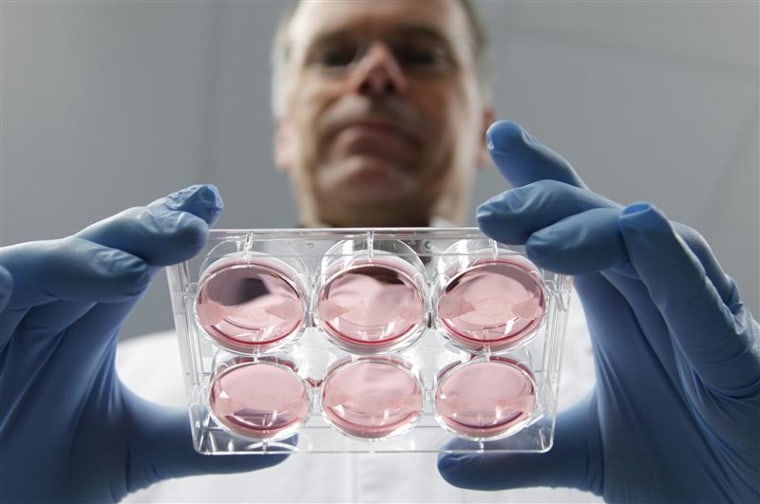After years of stem-cell cookery, University of Maastricht researcher Mark Post is finally ready to serve up a $320,000 hamburger made from meat grown in a culture dish.
The tasting will be conducted in front of an invited audience in London on Aug. 5, Ogilvy Public Relations announced in a media alert.
"The event will include a brief explanation of the science behind the burger before it is cooked and tasted," the advisory read. The public relations agency told NBC News that it could provide no further information until later.
Tastes 'reasonably good'
Post and his Dutch colleagues have been working on ways to create palatable lab-grown beef by growing bovine stem cells in a vat, turning them into tens of thousands of thin strips of beef muscle cells, mincing them into tiny pieces, then putting them together with lab-grown animal fat to create a lump of "meat."
In May, Post told The New York Times that the meat tasted "reasonably good" in preliminary tests, even before the fat was added.
An anonymous benefactor reportedly donated €250,000 ($320,000) to fund the experiment. Ogilvy Public Relations' Anya Du Sauzay declined to identify the donor, but said the identity would be revealed in advance of August's cookout.
Meat without the moo
The aim of the research is to bring the day closer when meat can be produced without having to raise and kill livestock — a costly enterprise that is abhorrent to some people. Meat production takes up more than half of the world's estimated agricultural capacity, and that proportion is expected to grow due to rising affluence in China and other areas of the world.
Last year, Post told reporters that growing meat in the lab rather than on the farm could reduce the required energy expenditure by 40 percent. But it's taken almost a decade of trial and error to get this far on the meat frontier, and it's likely to take at least that much longer to make lab-grown beef commercially viable.
The good news is that Post says the second lab-burger should go for less than the first: €200,000, or $257,000.
More about the food frontier:
- Want to save the planet? Ditch meat
- Scientists turn stem cells into pork
- NASA funds project for 3-D-printed food
- Future of food: Drinkable bagels and beyond
Alan Boyle is NBCNews.com's science editor. Connect with the Cosmic Log community by "liking" theNBC News Science Facebook page, following @b0yle on Twitter and adding +Alan Boyle to your Google+ presence. To keep up with Cosmic Log as well as NBCNews.com's other stories about science and space, sign up for the Tech & Science newsletter, delivered to your email in-box every weekday. You can also check out "The Case for Pluto," my book about the controversial dwarf planet and the search for new worlds.
